Day 4 in Singapore marked the halfway point of the artistic swimming competition at these World Championships, and it was a busy one. With three events on the schedule, the day began with the technical team preliminaries, before two world titles were decided in the men’s free solo and the technical duet finals.
Seasoned champions once again rose to the occasion: Aleksandr Maltsev extended his legacy with a sixth World title in the men’s free solo, while triplet sisters Anna-Maria and Eirini-Marina Alexandri of Austria claimed their first technical duet gold. As new faces continue to emerge on the world stage, these familiar names reminded everyone why they remain at the very top.
TECHNICAL DUET FINAL
The 12 highest-ranked pairs from Friday’s preliminary round returned for the technical duet final, each with time to fine-tune their performances, and, for some, to strategize. With degrees of difficulty tightly packed between 35.00 and 36.95 for 11 of the 12 duets, the final came down to execution, precision in the Technical Required Elements (TRE), and artistic impression.
Of note, of the 24 athletes who competed in this event at the last World Championships in Doha, only two — Lucrezia Ruggiero (Italy) and Audrey Lamothe (Canada) — returned here in Singapore, a sign of how much this field has evolved in this post-Olympic year.
Austria’s Anna-Maria and Eirini-Marina Alexandri, the reigning European champions and gold medalists in the free duet in 2023, delivered a brilliant “Swan Lake” routine to take their first world title in this event with 307.1451.
They had already topped the preliminaries and entered the final as clear favorites, and they didn’t disappoint. Their execution, particularly on TRE3, was exceptional: the flamingo bent knee rollback, to join to vertical position was textbook perfection, with rock-solid stability.
This is the only routine they’re performing at these championships, and they made it count with a well-deserved win that marked their return to the world stage.
“We are very happy to be back [at the World Championships],” Anna-Maria said. “I had a shoulder dislocation in the summer of 2023, so I was in a lot of pain. It hadn’t fully recovered for the World Championships in Doha so we had to withdraw from the World Championships and focus on being ready for the Olympics. So now we are very happy, because this was the highlight of the year and we finished with a gold medal.”
Silver went to the Lin Yanhan and Lin Yanjun of the People’s Republic of China for their “Warriors of Moon Shadow” routine. The twins, making their World Championships debut, had slightly increased their Degree of Difficulty (DD) from the preliminaries, going from 35.30 to 35.70.
Unfortunately, their swim in the final wasn’t as strong, and their TRE5a was frankly sloppy. Apparently, that however didn’t really matter. Their execution scores still somehow floated comfortably in the low to mid-7.0s for that element, and in the end, they walked away with a silver and a score of 301.4057. Even they, and their coaches, looked surprised.
“We made some mistakes in the routine and didn’t complete the movements too well,” Yanjun said. “We were a little nervous before the competition, but we tried our best to be calm and just treat the routine as practice. In the past month, we needed to spend some time training the team events and we lost out on some practice time for the duet. There were also some changes in the routine, so maybe we were not as familiar with it as we could have been.”
Meanwhile, Mayya Doroshko and Tatiana Gayday of Neutral Athletes B delivered an excellent performance. They looked more confident throughout the routine than in the preliminary round, and delivered all elements with sharpness, control and precision.
Their “Indian Dance” routine was one of the most convincing of the day, and they clearly rose to the occasion in their first season swimming together. But despite the superior swim and execution, they scored 300.2183 and had to settle for bronze, just over a point behind China. Go figure. Surely, this duet deserved better.
Japan’s Higa Moe and Sato Tomoka, who placed eighth in duet at the Paris Games, earned a solid fourth place here with their “Android” routine, which is a strong step forward for a pair that did not compete in Doha.
Rounding out the top five were Spain’s Lilou Lluis and Txell Ferré, both Olympic bronze medalists in the team event, who showed bold strategy by increasing their DD from 34.75 in the prelims to 36.60 in the final. Swimming to Elle King’s “Ex’s & Oh’s”, the pair ended their first season as a duet quite well, but the jump in difficulty didn’t shift their final placement.
MEN’S FREE SOLO FINAL
The men’s free solo final featured a strong field of 14 athletes, a significant step forward from the nine who competed in Doha in 2024. With no preliminary round like in the technical solo, the event went straight to the final, showcasing both familiar nations and a wave of new talent on the world stage.
Aleksandr Maltsev of the Neutral Athletes B added a sixth World title to his name with a captivating performance to Ludovico Einaudi’s “Eros”. Swimming third in the order, the 30-year-old delivered a routine that built beautifully in intensity, with exceptional height, travel across the pool and refined movement quality. His score of 229.5613 set a bar that remained unreachable for the rest of the field.
“I’m very happy because I was very nervous today,” he said. “It’s a very difficult routine for me, more than the technical routine because there are six long hybrids. We need to show very good technique, and also combine it with expression and artistic impression to have high scores. So, I’m very satisfied that I could show my best swim today, especially because I’ve been doing this routine for only one month.”
17-year-old Guo Muye of the People’s Republic of China earned silver with 220.1926 for his “Expedition”-themed routine, marking his first medal at his first senior World Championships. Guo, who won gold at the World Cup Super Final and bronze at the World Junior Championships in this event, had placed fourth in the technical solo earlier this week and continues to solidify his place among the sport’s top young male athletes.
“I feel quite happy about winning this medal, but this is not yet a gold, so I still have much to work on,” he said. “I know I need to get better with the height and lines of my routines, as well as my eye contact and interaction with the judges. I’ve finished my solo events now, and it’s quite a relief. It’ll help me perform better later on.”
Italy’s Filippo Pelati, also making his World Championships debut, took bronze with 213.9850. The 18-year-old is the reigning World Youth Solo Champion and 2024 European Junior Champion in this event. After placing sixth in the technical solo earlier this week, he delivered a strong “Devil”-themed routine to earn his first medal in Singapore.
“I’m very happy with my performance because I didn’t expect the result,” he said. “I was only enjoying the moment, and I only felt the music and the choreography and thought about nothing. I’m very proud of myself and happy to win a bronze. It’s very important for me; it’s like a gold medal and I’m very emotional.”
With the men’s solo events now done and dusted, most of the men will now move on to the mixed duet routines in the coming days.
TECHNICAL TEAM PRELIMINARY
The morning session featured the preliminary round of the technical team event, with 26 nations vying for a top-12 finish and a place in the final. For many teams, it was likely a tough turnaround, after having just competed the night before in the free team final. That meant they had only a few hours to recover and refocus on a completely different routine.
The People’s Republic of China, reigning Olympic and World Champions, once again set the standard, earning 306.2460 with their “Wukong” routine, first unveiled at the World Cup Super Final. The Chinese delivered a performance that was sublime, simply just a bit sharper, higher, closer in pattern, and tighter than the rest of the field, with outstanding execution and precision throughout this very well-built choreography.
The team of Neutral Athletes B, composed entirely of Russian swimmers who were newcomers to the senior world stage — and for three, their first international appearance — still impressed with their “Sabre Dance” routine. Featuring the highest DD in the field at 49.0750, the young team opened with a spectacular acrobatic move that earned two 10.0s, and displayed great technique and execution. They finished second with a score of 295.4633, but will surely be fighting their hardest for gold tomorrow.
Sitting in third is the team of Spain, reigning European Champion and world silver medalist in this event, with a routine set to the Backstreet Boys’ “Everybody.”
Elsewhere, several teams faced setbacks. Japan, France, Canada and the USA all received basemarks, impacting their potential for higher placement. Japan, notably the reigning world bronze medalist, will be looking for a better performance in the final to contend for a podium place again.
Team USA faced unexpected adversity when Olympic silver medalist Daniella Ramirez had to withdraw just moments before the swim. Reserve Emileen Moore was called in so late she appeared without a headpiece, but rose to the occasion and handled her World Championships debut with poise and confidence.
The team, fourth at the Doha World Championships in this event, incurred two basemarks but still ranked 12th and qualified for the final, where they’ll be hoping for a steadier performance.
“It was a very hectic time, and emotions were running high,” Moore told USA Artistic Swimming. “There was a lot of uncertainty, but once the decision was made for me to swim, I knew I had to make a choice, and I chose the team. There was never any doubt about whether I could do it; I just had to trust in myself and in the team. Of course, I was nervous, but with the support of my teammates and coaches, I was able to channel that energy into confidence. Honestly, there wasn’t even enough time to fully process the fact that it was my first World Championships. I just locked in on where I needed to be in the team.”
The 12 teams qualified to the final are the People’s Republic of China, Neutral Athletes B, Spain, Italy, Ukraine, Japan, Neutral Athletes A, France, Greece, Canada, Israel and the USA.
The technical team final is scheduled for tomorrow, Tuesday July 22 at 6:30 pm local.
ARTICLE BY CHRISTINA MARMET
Cover photo: Giorgio Scala / Deepbluemedia
If you’ve enjoyed our coverage, please consider donating to Inside Synchro! Any amount helps us run the site and travel costs to cover meets during the season.

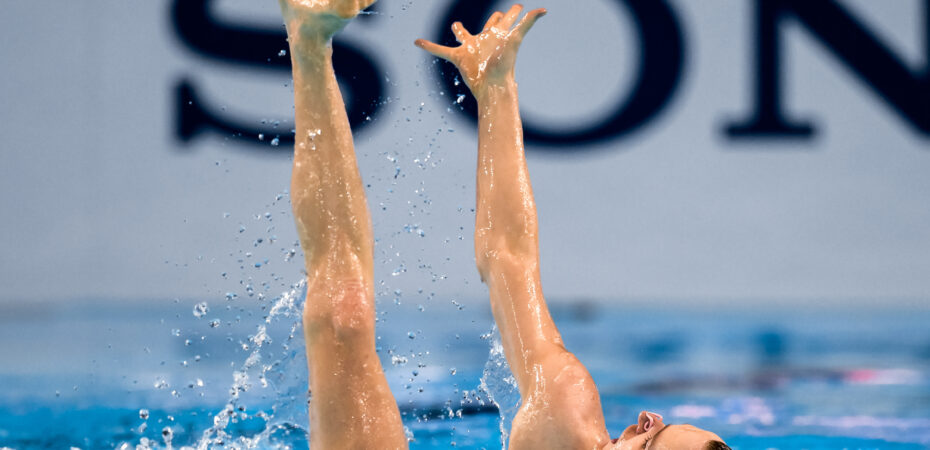
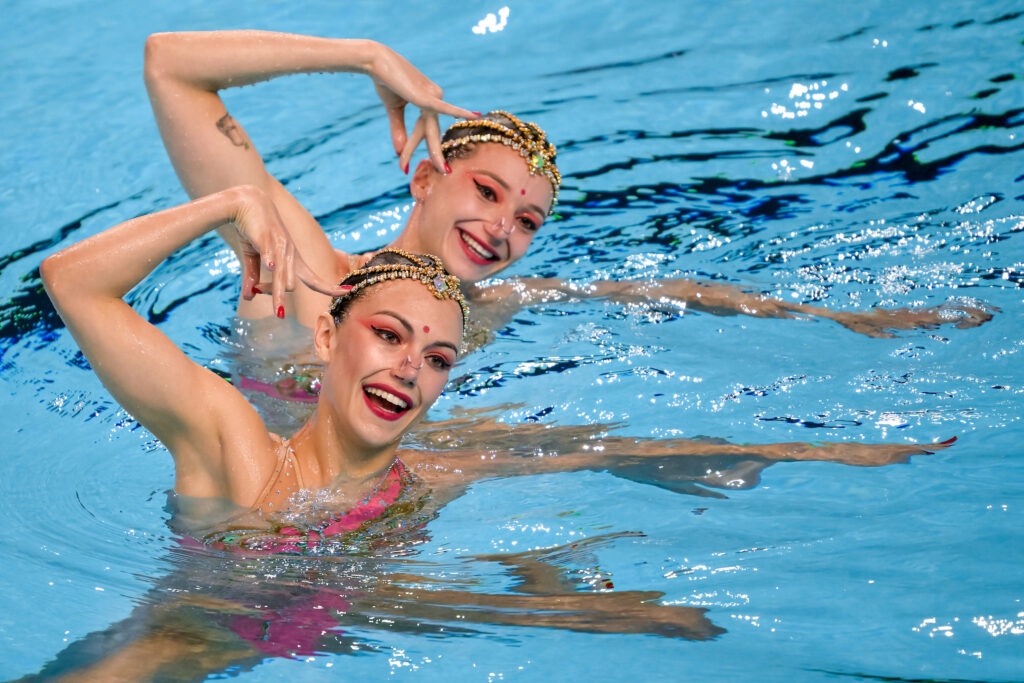
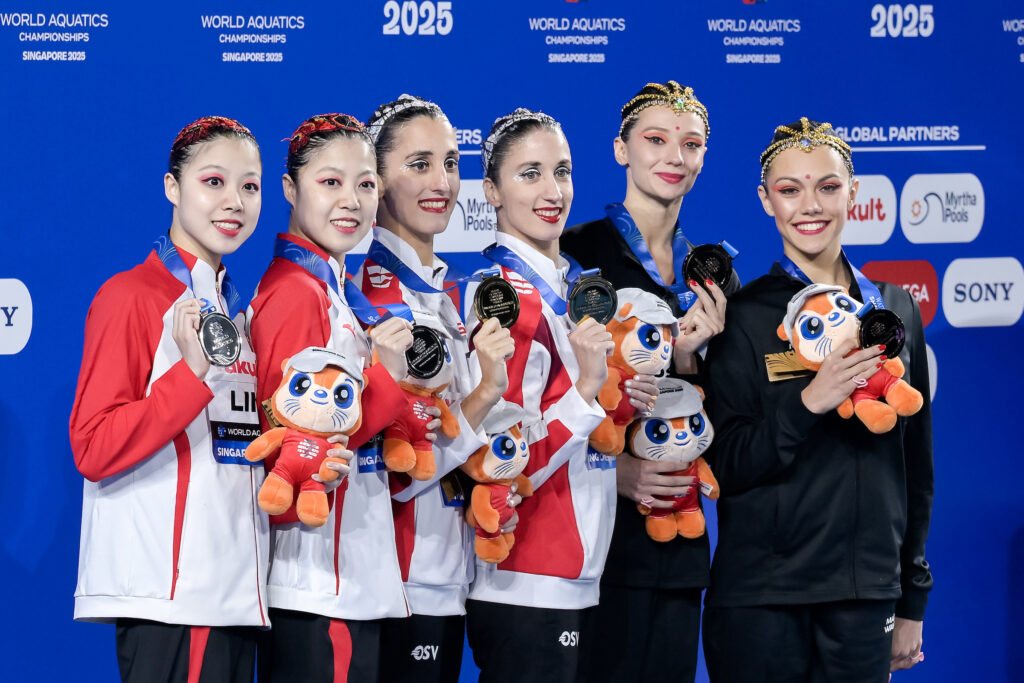
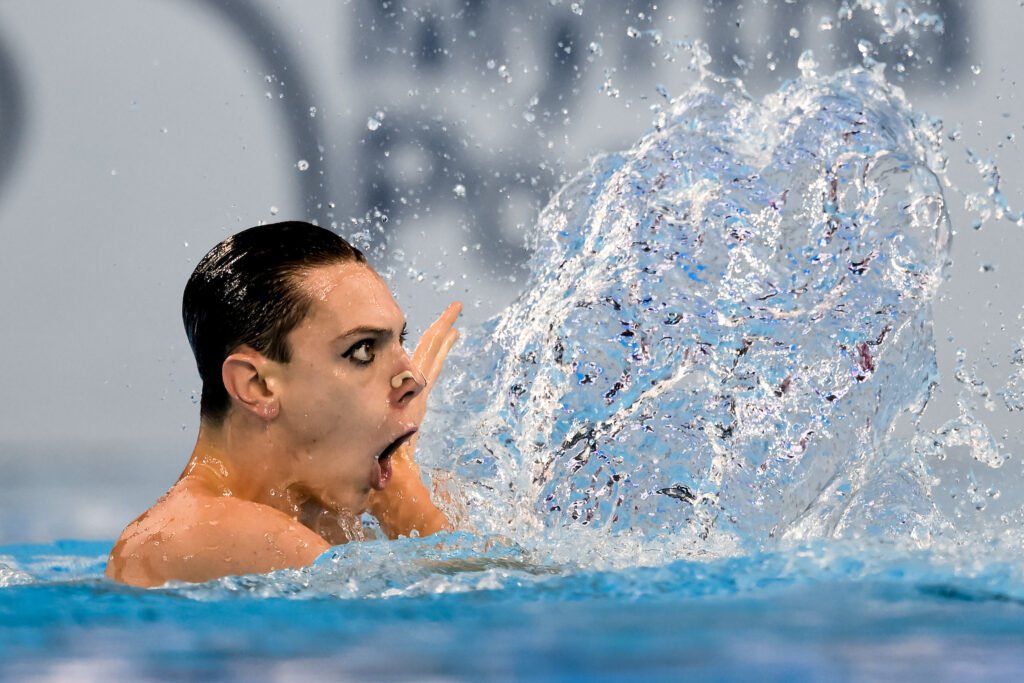
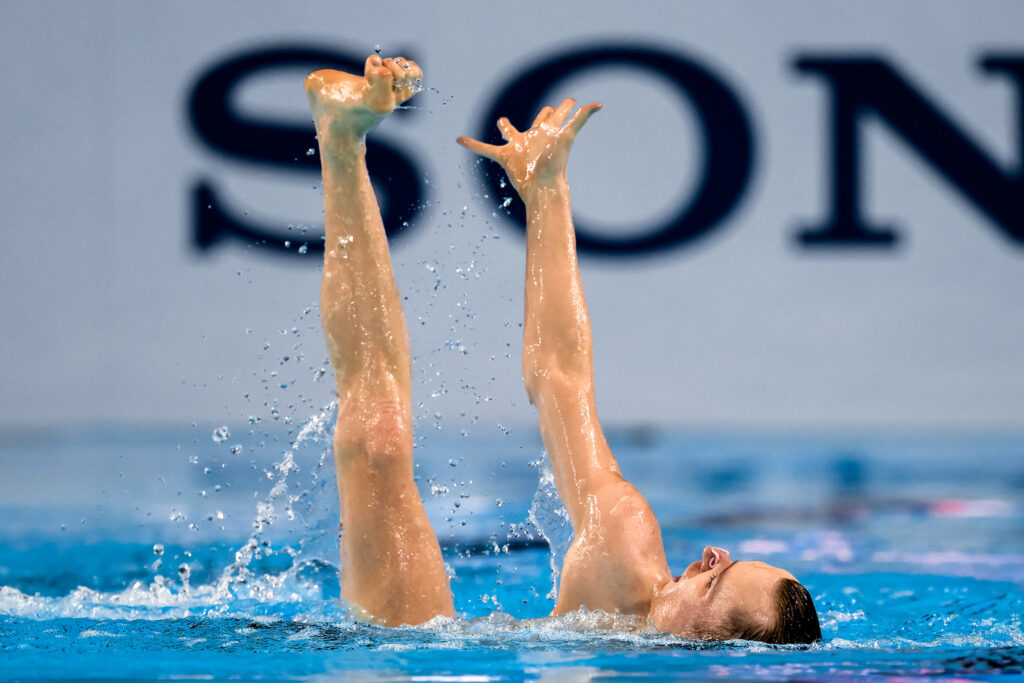
Very proud of Team USA Character in a very difficult situation last minute change minutes before a very important swim great job Emma and Team USA. You will do great in finals 🇺🇸